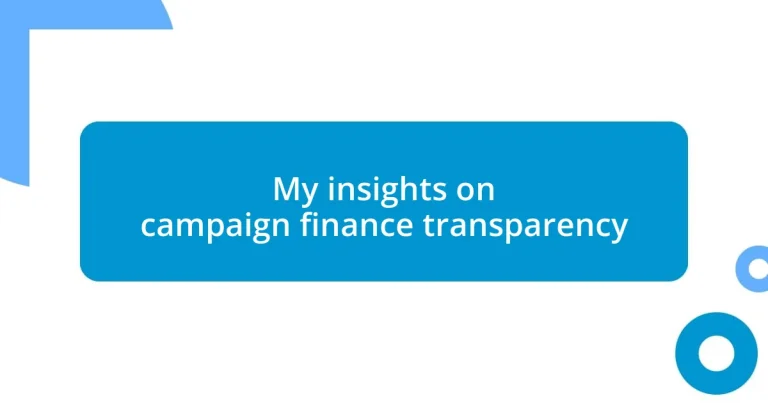Key takeaways:
- Transparency in campaign finance is essential for building public trust and enhancing voter engagement.
- Current laws on campaign finance, like the Bipartisan Campaign Reform Act, vary by jurisdiction, leading to potential confusion and loopholes.
- The influence of dark money and anonymous donations poses significant challenges to the integrity of elections.
- Advancements in technology can enhance transparency, allowing real-time tracking of contributions and fostering deeper connections between candidates and voters.
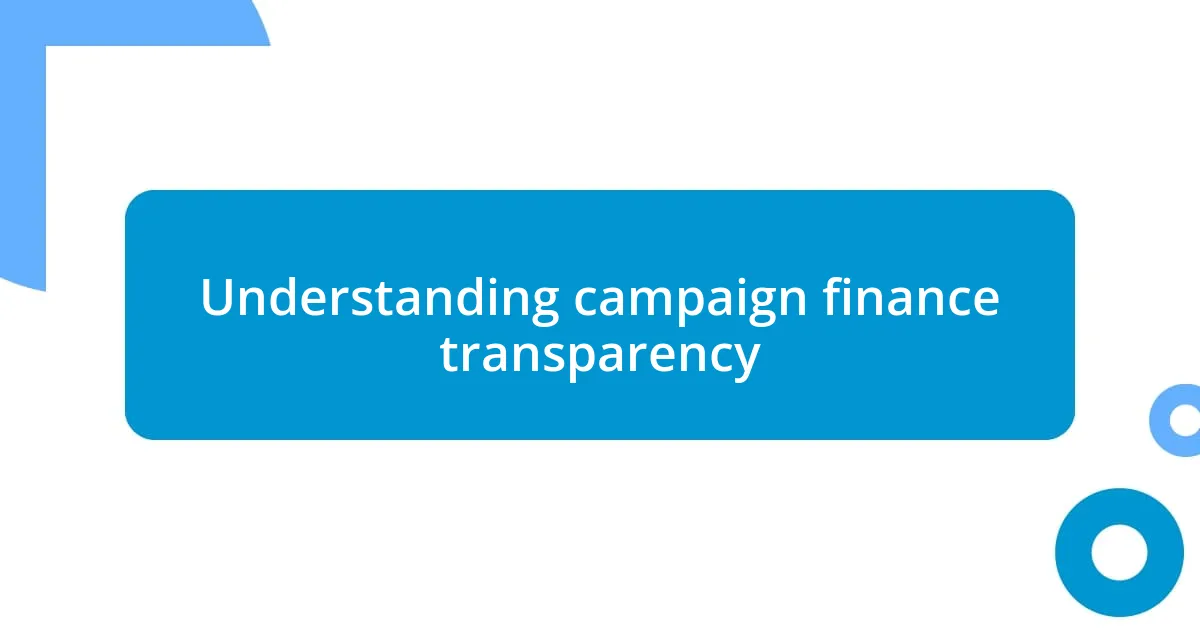
Understanding campaign finance transparency
Understanding campaign finance transparency is essential for fostering trust in our democratic processes. I often reflect on how the clarity—or lack thereof—can greatly affect voter perception. When I learned about a recent scandal involving undisclosed donations, it struck me just how crucial transparency is in shaping public trust.
In my experience attending town hall meetings, I’ve noticed how constituents feel empowered when they know where funding is coming from. It’s like being invited into a conversation rather than just hearing the one-sided narrative from political ads. Doesn’t it make you wonder how many potential voters might feel disengaged if they don’t understand the financial backing behind their candidates?
I believe that transparency isn’t just a political ideal; it’s a necessary component of accountability. One time, I dove into a candidate’s financial reports, and the overwhelming amount of information was both enlightening and daunting. That experience highlighted for me how transparent funding can either bolster or erode public confidence, depending on how it’s managed and communicated.
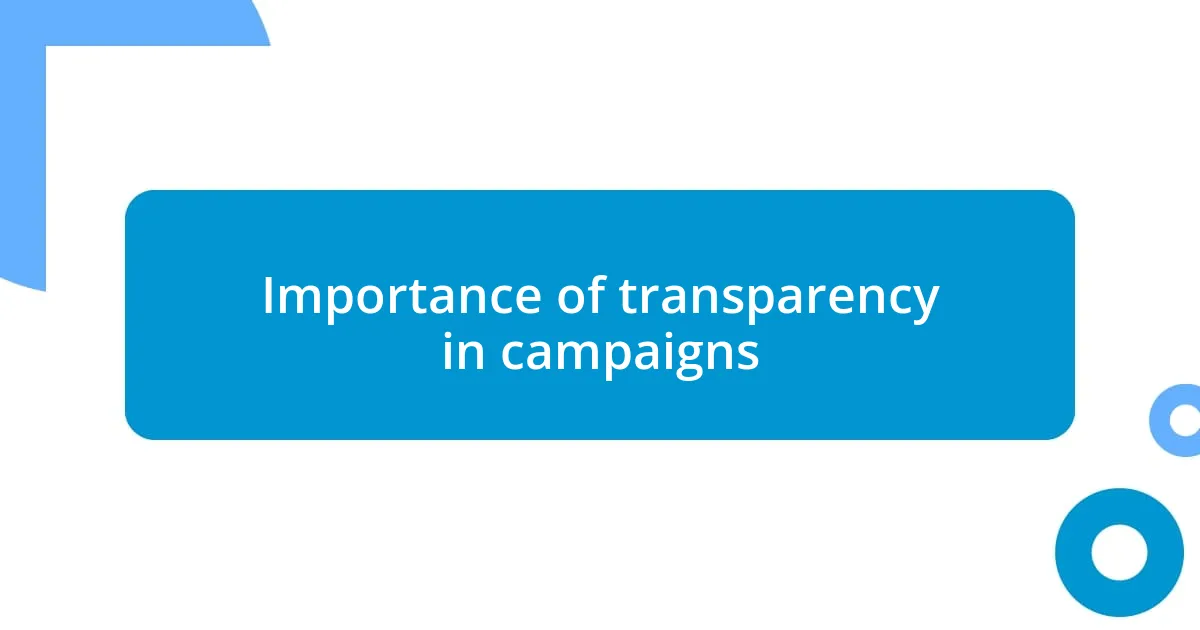
Importance of transparency in campaigns
One of the most striking aspects of transparency in campaigns is its power to create informed voters. I remember attending a local debate where candidates openly discussed their funding sources. The sincere willingness to share this information not only made me respect them more but also inspired others to engage actively in the conversation. It was a powerful reminder of how transparency can demystify the political process and invite participation from those who might otherwise feel excluded.
Here are a few reasons why transparency is vital in campaigns:
- Builds Trust: When voters see clear information, they are more likely to trust candidates and their messages.
- Enhances Accountability: Candidates know they are being watched, which can deter unethical financial practices.
- Empowers Citizens: Voters are better equipped to make informed choices when they understand the financial dynamics at play.
- Reduces Corruption Risks: Clear regulations and financial disclosures can lower the chances of illicit activities in campaign finance.
- Encourages Fair Competition: Transparency levels the playing field, allowing candidates, regardless of their financial backing, to have a fair shot.
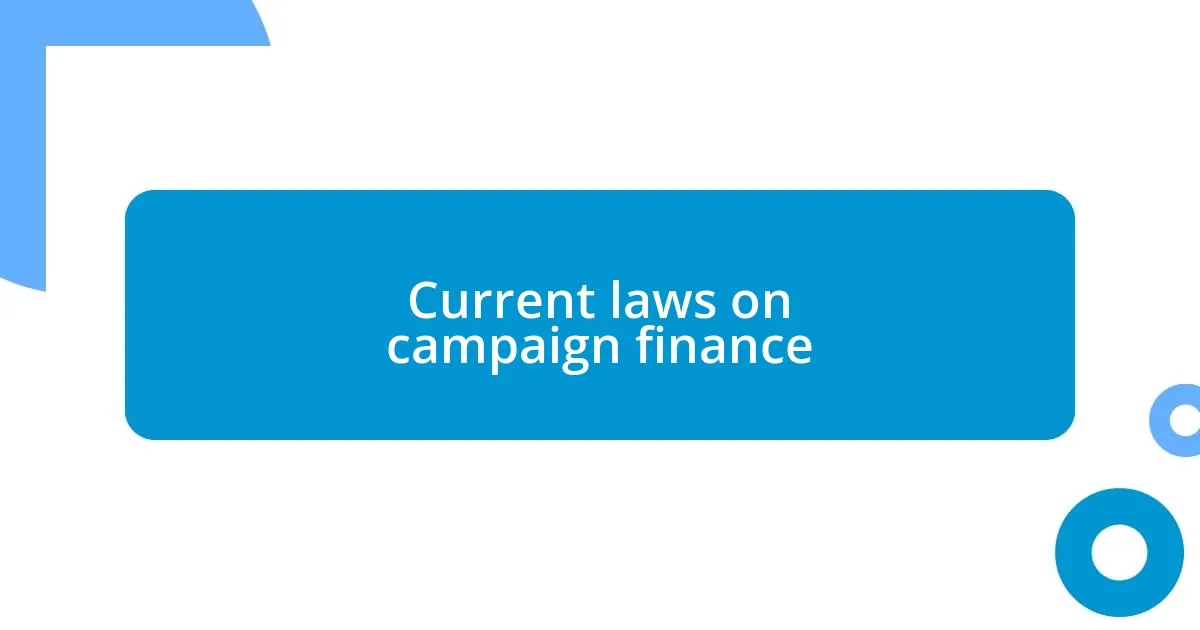
Current laws on campaign finance
Current laws on campaign finance vary significantly across different jurisdictions, but at the federal level in the United States, the Bipartisan Campaign Reform Act (BCRA) of 2002 is a fundamental piece of legislation. This act focused on reducing the influence of soft money in federal elections, emphasizing the need for transparency in the reporting of contributions. In my experience observing various elections, it’s fascinating how sometimes candidates openly comply with these laws, while others seem to skate around them, raising questions about enforcement and effectiveness.
Interestingly, many states have their own campaign finance laws, which can sometimes be more stringent than federal regulations. For instance, some states require immediate disclosure of all contributions above a certain threshold, while others may not mandate reporting until the end of a financial cycle. This variation often leads to confusion among candidates and voters alike. I recall a time when a local candidate seemed unsure about what constituted a reportable contribution, highlighting the complexities that exist within campaign finance regulations.
Despite the existence of these laws, loopholes still emerge, leaving room for undisclosed funding sources that can undermine the purpose of transparency. Super PACs, for example, can accept unlimited donations while maintaining the ability to keep donor identities hidden. This creates a paradox where significant financial backing could influence election outcomes without the public ever knowing the sources. It certainly makes me wonder whether true transparency is achievable in our current system.
| Law | Description |
|---|---|
| Bipartisan Campaign Reform Act (BCRA) | Focuses on limiting soft money contributions and ensuring transparency in campaign funding. |
| State Laws | Varies by state; may include immediate disclosure requirements or less stringent reporting rules. |
| Super PACs | Allow unlimited donations but can keep donor identities confidential, raising questions about transparency. |
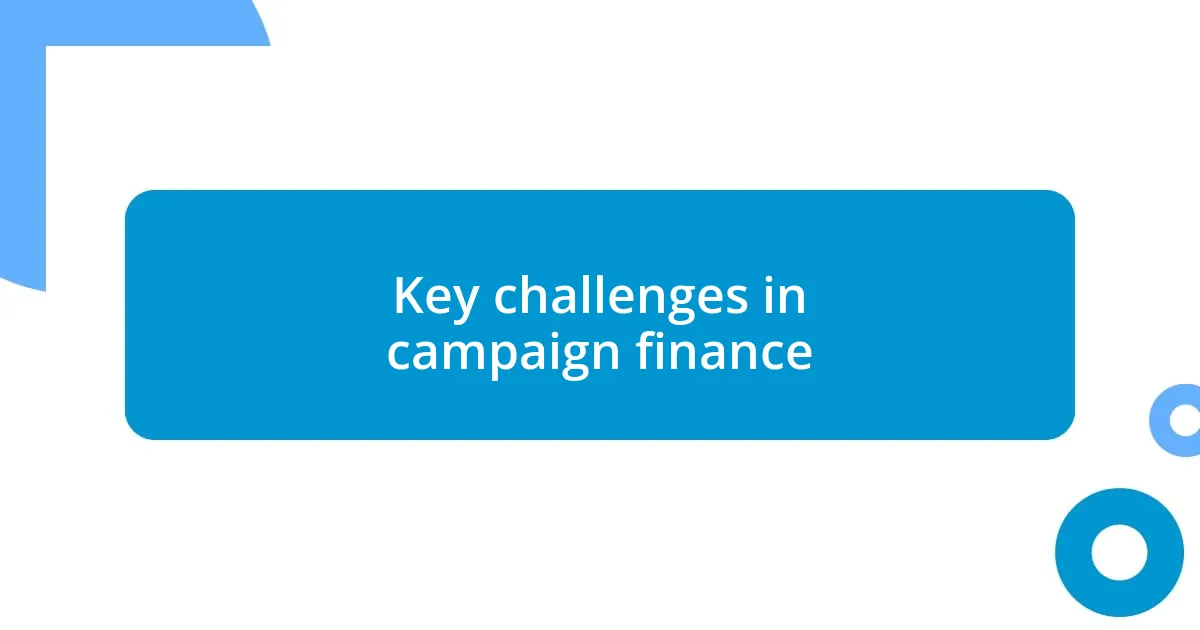
Key challenges in campaign finance
Navigating the maze of campaign finance can be incredibly daunting for candidates, especially when they encounter the complexities of different laws and regulations. I remember a local campaign I followed closely where the candidate spent weeks sorting through the various requirements, only to discover some of the rules had changed mid-cycle. This sheer unpredictability can lead to frustration not just for candidates, but also for voters, who may feel disconnected from the political process when there’s so much red tape involved.
Another significant challenge is the influence of dark money that flows into campaigns without a clear source. It’s unsettling to think about how much power anonymous donations wield over our elections. I once attended a political meeting where a grassroots activist shared her concerns about a hefty contribution from an undisclosed source influencing a candidate’s stance on key issues. The question lingered in my mind: if voters don’t know who is really funding candidates, how can they trust that those candidates will act in the public’s best interest?
Furthermore, the pressure to secure large donations can sometimes compromise candidates’ principles. I’ve seen it firsthand when candidates, in their pursuit of funding, shift their messaging to align with donor interests rather than their original platform. It makes me wonder, which is more crucial in politics: staying true to your beliefs or playing the fundraising game? The heart of campaign finance challenges lies in striking that delicate balance, and it’s a constant battle in today’s political landscape.
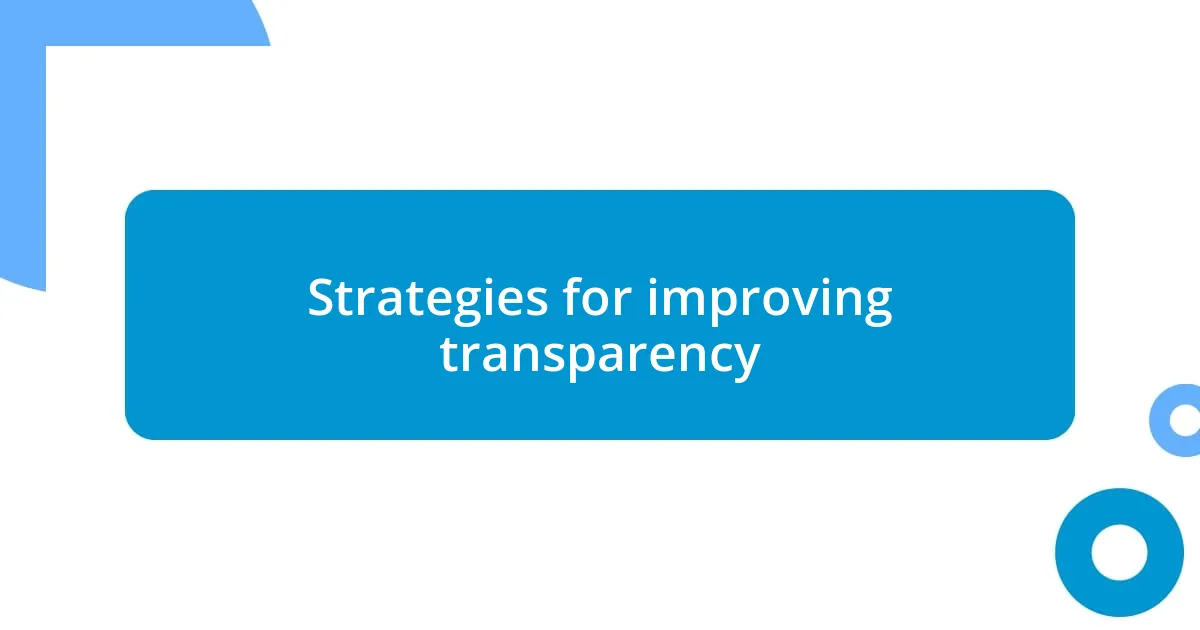
Strategies for improving transparency
Improving transparency in campaign finance is certainly a multi-faceted challenge, and I believe one effective strategy is to enhance technology use in reporting. For instance, implementing user-friendly online platforms for candidates to disclose contributions in real-time could make a significant difference. I once played around with an online donation tracking tool during a campaign, and it was eye-opening to see how quickly information could be aggregated and made accessible to voters.
Another avenue for boosting transparency lies in establishing independent oversight committees. These groups could have the power to audit campaign finances, providing an unbiased perspective on compliance with the laws. I remember hearing from a community member who proposed a citizen-led initiative aimed at monitoring local campaigns. The enthusiasm was palpable, highlighting a desire for accountability that could engage voters and build trust. Doesn’t having a watchdog enhance our confidence in the system?
Lastly, advocating for mandatory donor transparency laws could have a profound impact. If all organizations, including Super PACs, were required to disclose their donors, the landscape would change dramatically. I can’t help but think of how liberating it would feel as a voter to know who really stands behind a candidate. Imagine being able to assess motivations behind financial support; it would empower us to make informed choices at the ballot box.
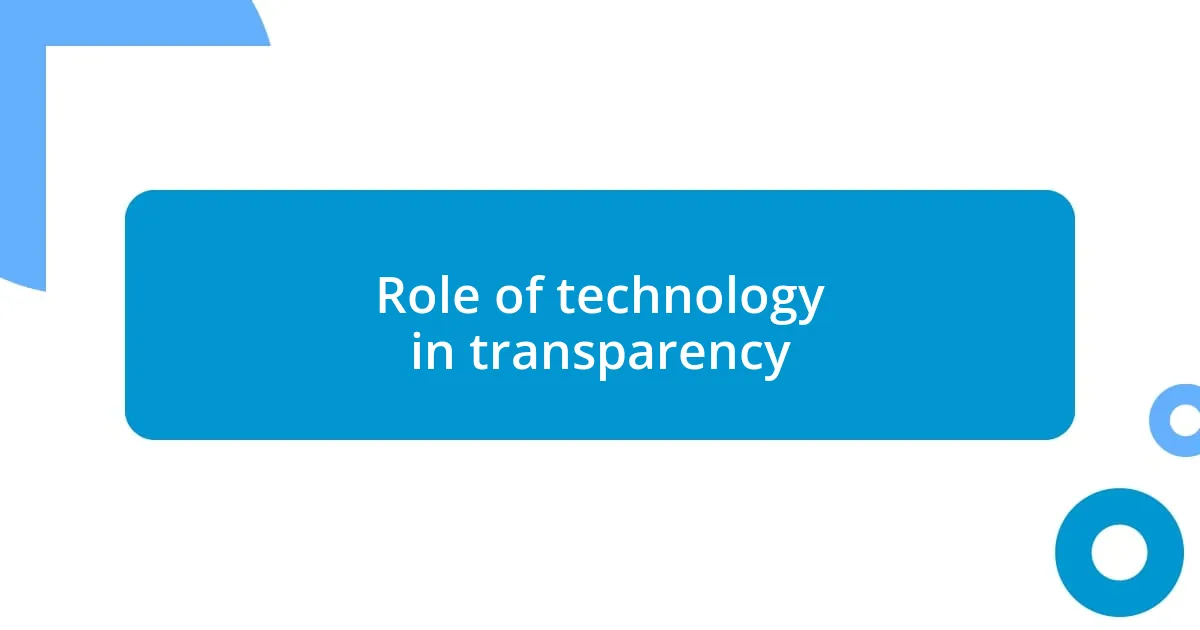
Role of technology in transparency
In today’s digital age, technology plays an essential role in enhancing transparency within campaign finance. I recall a time when I helped a candidate set up a simple online donation portal, and it struck me how this tool not only streamlined contributions but also provided instant visibility for voters. When people could see in real-time who was funding a campaign, it sparked conversations and inquiries that empowered the community to engage more actively.
Moreover, advancements in data visualization software have the potential to transform how voters perceive campaign finance information. I remember attending a town hall where a tech-savvy volunteer showcased a dynamic dashboard that mapped out funding sources for local candidates. People were fascinated as they saw the connections between contributors and the issues they cared about. Isn’t it incredible how visual tools can ignite a sense of ownership among voters regarding the political process?
Additionally, leveraging social media platforms to share transparent financial reports could forge deeper connections between candidates and constituents. I’ve witnessed candidates go live to discuss their funding sources and expenses, fostering a sense of authenticity. Doesn’t it feel refreshing when politicians choose to be candid? This kind of openness not only builds trust but also encourages more educated voting, empowering citizens to hold their representatives accountable for the decisions they make.
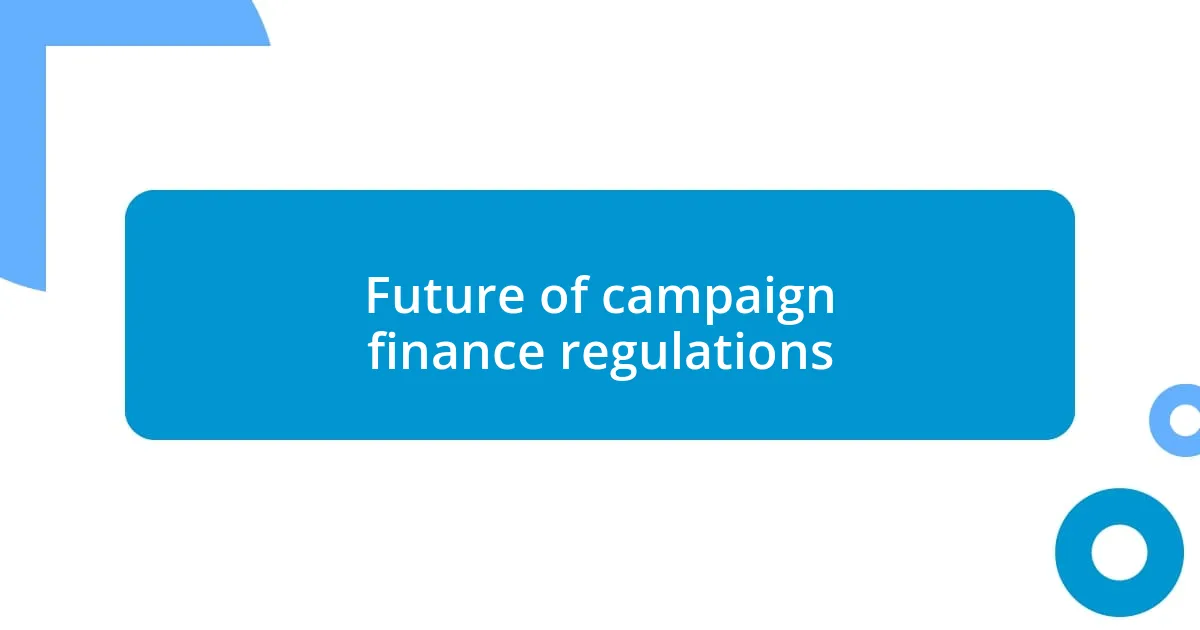
Future of campaign finance regulations
As I think about the future of campaign finance regulations, I can’t help but feel that a shift toward more stringent rules is on the horizon. For one, the increasing calls for corporate accountability in political funding hint at a societal desire for change. During a brainstorming session I attended, a participant passionately argued that without stricter limits, our democracy might fall into the hands of a few affluent donors. Can we really claim to have a representative system if only the wealthy have their voices amplified?
In my experience with local political movements, I’ve seen how grassroots organizations can ply the field for more equitable practices. There’s something invigorating about community-driven initiatives pushing for reforms. I remember volunteering for a campaign that focused on educating voters about campaign finance, which not only increased engagement but also sparked a larger conversation about fairness. How empowering is it to think that collective action could actually lead to more balanced regulations?
Looking ahead, I believe we may witness a push for dynamic regulations that adapt in real-time to the evolving landscape of social media and digital fundraising. I’ve participated in discussions where individuals expressed concern over dark money flowing through online channels, often unnoticed. This demonstrates how crucial it is to update and rethink our legislative frameworks continuously. Isn’t it fascinating to consider how the very tools that connect us could also reshape the way we monitor and control campaign finances?












